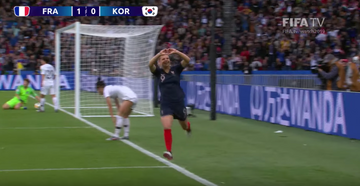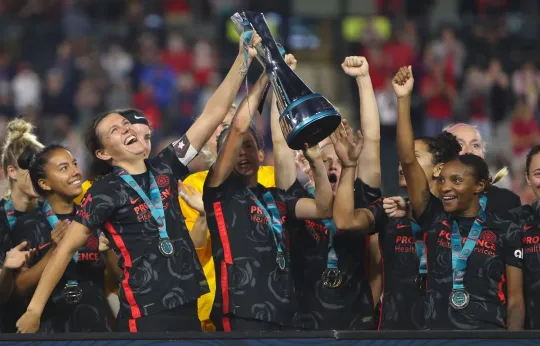This week, shortly over a year after Americans began to learn en masse of the Trump administration's horrifying policies of separating asylum-seeking families and incarcerating children at the border, and just days after a report citing "dangerous overcrowding" at an El Paso Border Patrol processing facility, the frothing white nationalist goons in charge of our nation's immigration policies have added once again to the litany of abuses.
Now, citing budget constraints, the Office of Refugee Resettlement has told contractors to cancel all activities at detention facilities holding unaccompanied minors that "are not directly necessary for the protection of life and safety." These include English classes, legal aid to children and recreational programs, including youth soccer.
Incarcerating and traumatizing these kids wasn't bad enough; now they have to take away soccer too.
Let's make three things clear before continuing.
Of course these children should not be in federally-run prison camps in the first place. They should be reunited with their families and have their safety, dignity and humanity respected as asylum seekers, as children, as human beings. And no, of course cutting recreational soccer programs is not as dire of a human rights abuse as cutting off legal aid, again, to children. We should get mad and stay mad about this entire chapter in our sordid, shameful collective history.
And of course this warped decision should not be a springboard to call for an increase of funding to ICE, CPB or private detention centers. The lives and dignity of children should never be a bargaining chip, and the correct answer for the amount of our tax dollars that should be spent on separating families or incarcerating children in the first place, or a racist, ecologically disastrous border wall is zero. Zero dollars.
We know that this administration's capacity for cruelty is designed to shock and exhaust and overwhelm. We know, as Adam Serwer put it so succinctly, "the cruelty is the point." The administration can talk about budgetary needs all it wants, but these choices are clearly designed to further strip immigrant and refugee children of their human experiences and exacerbate the trauma and misery of detention. As ESPN writer Sharon van Epps pointed out, "Soccer literally costs nothing." There's a reason we romanticize soccer as a "great equalizer," as a sport that transcends all differences, social stratification and geography. People all over the world play with bundles of rags or plastic bags for balls as van Epps notes, old shirts or lines in the dirt as goal markers.
With soccer, children undergoing a shared experience – albeit a deeply traumatic one that we wish on no one's children – have a chance to play, to connect, to develop social skills and bonds amidst their trauma and find an outlet for it, to actually be children and not just statistics, talking points, abstractions from a country not quite ready to grasp its own horrors. As "the world’s game," soccer is also presumably a shared lingua franca across nations and borders and points of origin, a means of finding some common ground and familiarity in a strange and brutal environment.
This is happening on the heels of the Champions League final, ahead of the most anticipated Women's World Cup in the history of the tournament. We saw scenes of ebullience and joy around the world as Divock Origi, himself the son of immigrants, netted the game-winner, as hometown boy Trent Alexander-Arnold lifted the trophy showered by confetti. We will see the world come together once again and celebrate international footballing excellence starting tomorrow, singing the praises of Bunny Shaw and Onome Ebi and Wang Shuang. If only for a few weeks, these international tournaments contribute to our mutual understanding of lives and experiences worlds away, empowering us to find commonality in a sport we all love so much.
It's a cliché as old as clichés themselves, but footballing tournaments are a reminder of how competition and joy and narrative contribute to human bonding, of how sport never exists in a vacuum. We look beyond borders and colors and flags, if only briefly, to see people playing a game, and celebrating goals, and reveling in the thrill of it all.
Competitive sport, that challenge and collaboration and celebration, is the most human of pursuits. We learn this as children, stumbling over grass in our gaudy AYSO uniforms, keeping up with the older neighbor kids in alleys or on dirt pitches. To deny access to this most human of experiences, to deny play and connection, to children, is to fail to acknowledge said children as fully realized humans with the same impulses and desires and needs of the children on the lush fields of the suburbias just beyond. This is a craven attempt to further dehumanize incarcerated children, to paint them as the other, to paint their wants and needs and desires as less real or valid than those of their own children. It's symbolism that is powerful and ugly as the action itself, the denial of one small but significant comfort.
International competitive sport can be a balm for many in difficult times, a means of escape and finding necessary joys. But even ahead of the excitement, we cannot forget our shared humanity. We cannot forget to hold space in our consciousness and in our actions and find ways show up when anyone's humanity is seen as negotiable.
(Photo: Markus Spiske/temporausch.com)






